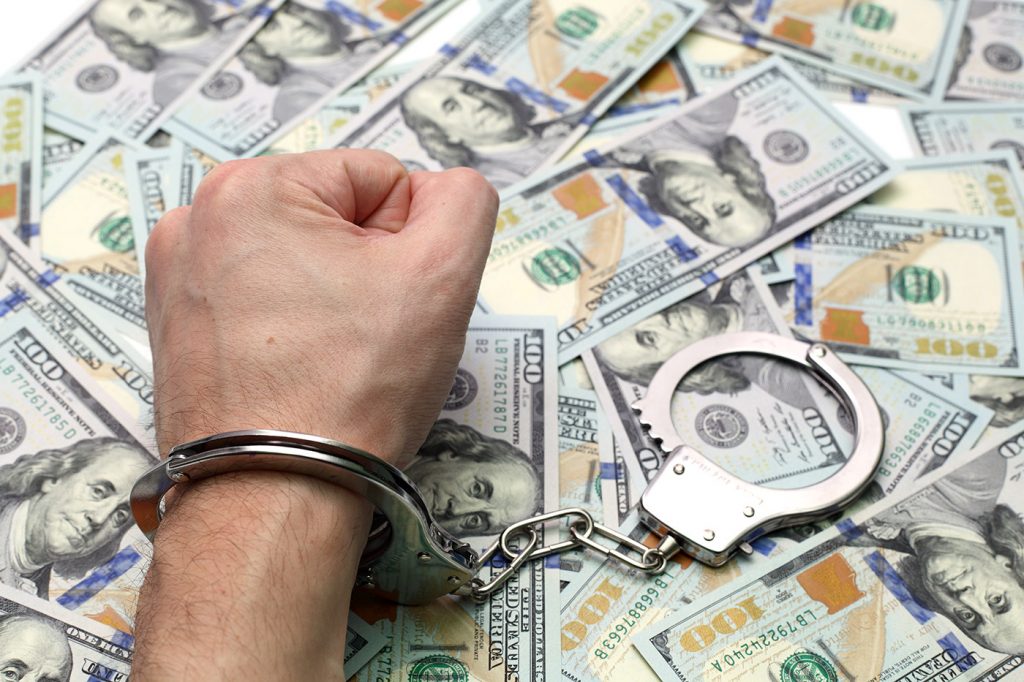Kalief Browder, an African American sixteen year old from the Bronx in New York City, was walking home from a party with his friend when he was stopped by police unexpectedly and charged with an alleged theft in 2010. The accuser, Roberto Bautista, was sitting in a police squad car and identified Browder and his friend as the thieves. The theft was a backpack that was said to contain $700 dollars, a credit card, and an iPod Touch. In his interrogation, with police, Kalief Browder insisted that he had not robbed anyone and that neither the backpack nor its contents would be found in his possession. Browder and his friend were then taken to the precinct where they were processed and taken to central booking. Within the following 48 hours Browder was interrogated and charged with robbery, grand larceny, and assault. At arraignment, bail was set at $3,000 dollars. If Browder’s family used a bondsman the amount would be ten percent plus fees or around $900 dollars for his bail to the bondsman. The bondsman would then post the entire bail amount with the court. The family could not pay $900 resulting in Browder remaining imprisoned at Rikers Island for the next three years.1


Debtors jail in colonial America was used to lock up those who owed money to the government. In today’s society, it translates into the cash bail system. 4 The for-profit bail system in the United States is used to keep those who are accused of breaking the law from harming anybody else or to be sure the accused will appear in court. If the accused is unable to pay the bail at the time of the arraignment, they may use a bondsman or they will remain incarcerated until their trial. For the poor, it is the latter. For Kalief Browder it was the beginning of the end. Only two countries in the whole world have a cash bail system, the United Sates and the Philippines. The cash bail system results in unnecessarily imprisoning citizens who do not pose as a threat to society and who most likely are not a flight risk. No pre-trial information is given to a judge before setting bail and there are no set standards on setting the amount for bail per case.5 Those who are wealthy enough to pay avoid the scarring effect prison has on one’s life. But for those who cannot afford bail, they face violence behind bars, debt, isolation, and at minimum a harsh punishment for those later found innocent, as in Kalief Browder’s case. This has created a two tier system in our judicial process. The first tier are wealthy offenders who can post bail and the second tier is everyone else who cannot afford equal justice or treatment.
Statistics show that 60 percent of people in jail from 2005 to 2015 were in jail awaiting trial. Three fourths of these individuals were accused of nonviolent crimes.6 This is alarming. On a national level, the United States imprisons persons who are essentially living in poverty and who are more susceptible to being involved or accused of a crime. In some instances, the court can grant “release on one’s own recognizance” or ROR. However, this is determined on a state by state standard. An example of this would be New York, the judicial system there would be more willing to grant ROR if the individual has a cellphone, has had a New York address for a year and has a job.7 These may seem like easy standards to meet, but consider those who are homeless, unemployed or cannot afford a cellular service on a regular basis. Their fate rests upon pre-trial bail. The bail money that the defendant does not have, requiring a bondsman, but not always attainable either.

- Johnson, Stephon “‘Time: The Kalief Browder Story’ Shows Failure of Justice System” New York Amsterdam News, March 2, 2017 http://blume.stmarytx.edu:2048/login?url=http://search.ebscohost.com/login.aspx?direct=true&db=a9h&AN=121613807&site=ehost-live&scope=site. ↵
- Schwirtz, Michael, and Michael Winerip “Kalief Browder, Held at Rikers Island for 3 Years Without Trial, Commits Suicide” The New York Times June 08, 2015 https://www.nytimes.com/2015/06/09/nyregion/kalief-browder-held-at-rikers-island-for-3-years-without-trial-commits-suicide.html. ↵
- Schwirtz, Michael, and Michael Winerip “Kalief Browder, Held at Rikers Island for 3 Years Without Trial, Commits Suicide” The New York Times June 08, 2015 https://www.nytimes.com/2015/06/09/nyregion/kalief-browder-held-at-rikers-island-for-3-years-without-trial-commits-suicide.html. ↵
- Steinberg, Robin “Robin Steinberg: What If We Ended the Injustice of Bail?” TED (June 18, 2016.) Https://www.youtube.com/watch?v=3B24RaqA33k . ↵
- Lally, Sean “Can the U.S.Radically Alter Its Cash Bail System?” (October 23, 2017) https://attorneys.us/can-u-s-radically-alter-cash-bail-system/. ↵
- Gunasekera, Yousha “Bail Means Jail: Debtor’s Prison for the Unconvicted.” Progressive 81, no6 (August 2017): 56–59 http://blume.stmarytx.edu:2048/login?url=http://search.ebscohost.com/login.aspx?direct=true&db=a9h&AN=123986116&site=ehost-live&scope=site. ↵
- King, Elizabeth “Inside the Fight to End Cash Bail” Pacific Standard January 08, 2018 https://psmag.com/social-justice/meet-the-reformers-taking-on-alec-to-end-cash-bail. ↵
- “Bail Bond Services for Waco, Texas” Kocian Bail Bonds December 14, 2015 https://www.bailbondskocian.com/. ↵
- “Bail Reform” Official Website – Assemblyman Rob Bonta Representing the 18th California Assembly District (March 29, 2018) Accessed September 21, 2018 https://a18.asmdc.org/article/bail-reform. ↵
- Gonnerman, Jennifer “Before the Law” The New Yorker December 08, 2017 https://www.newyorker.com/magazine/2014/10/06/before-the-law. ↵



123 comments
Jacob Silva
This article truly does convey how corrupt, terrible, and unfair the United States justice system truly is. Its’s absolutely upsetting to hear that it is common for innocent people to be placed behind bars and how their only option to get out is to pay a bail that they’re financially unable to do. This is usually the case and they have to suffer for it.
Priscilla Poorbaugh
I have always hated the cash bail system. It really is just a way to suppress low income people. Why does it make sense that criminals should be let free to the streets just because they have money? It doesn’t. Money controls everything here in America and a reform is necessary to better our country.
Saira Locke
I think it is very concerning that 60 percent of the people incarcerated are awaiting trial. Jails are wasting money just to keep low risk people off of the streets. This doesn’t make any sense. The main problem in jails is overcrowding, I believe that this wouldn’t be a problem if they didn’t waste cells on people awaiting trial for hive little to no risk to society. It is wrong that the thing keeping a very dangerous person and a non-risk person out of society is money. The judicial system shouldn’t be about money in my opinion, it should be about justice. The last sentence really spoke to me because it proves that our law enforcement doesn’t always follow the laws themselves.
Jake Mares
Prison can be an extremely traumatic for anyone for one week much less the two years Browder was held. As many people say, this system seems to favor the wealthy to an inexcusable level. For profit bail definitely needs to be looked at a much higher level than it already is. Also, this highlights how a wealthy, dangerous criminal can walk free for a while, and a how an innocent man can be locked up for nothing.
Patricia Arechiga
The criminal justice system in the United States is by far one of the most flawed systems this country sustains. It is so well crafted so that in a way there is a form of white supremacy, which can be seen with bail costs, most of which are often affordable by the wealthy class. A disgusting amount of people lose their freedom due to the fact that they are unable to pay bail. With that, so many innocent people are in jail until trial, which can take up to years, because they can not afford the high costs and interests of bail. Children lose their loved ones, jobs lose an employee and overall society loses one of its own. Something has to be done about this so that there is recognition on what lies as the ‘criminal justice system’ in this country.
Mariah Garcia
The criminal justice system of the United States is a very backwards thing. The system itself is greatly flawed and resembles the slavery we learned about as children. Even though slavery as one might normally think about it isn’t at the forefront of the economic world, it is still alive and well behind closed doors. The US justice system is just a small part of that and this article did an amazing job of explaining and shedding light on this egregious happening.
Chelsea Alvarez
This article really highlights the effects that being wrongly accused of a crime can do to an individual. Although Kalief Browder did not commit the crime, he was still forced to remain in jail until he could either be let go or pay his bail. I feel that our legal system holds many flaws that need a little bit of improvement. I like how the process of getting and paying back a bondsman was explained in detail. It is very sad to say that this has happened nationally to many other individuals like Browder and until the system undergoes its changes, then maybe those who are wrongly accused may be able to continue living their life just as they were prior to their encounter with the law.
Amariz Puerta
It saddens me to see that our justice system puts innocent people in jail and we do not do anything about it. It is also sad to see that ordinary people do not have the financial support to be able to get out on bail even though they are innocent. This article was very moving to see how terrible our justice system is for putting innocent people in jail and not having a way to pay to get out and have their freedom.
Joshua Garza
This story is upsetting and disgusts me. I had never heard of this particular situation before with this person. It is plane to see that the law needs serious reform to people being accused of a crime because after all, the citizen is innocent until proven guilty. This is unjust and in my opinion this is a textbook case of the system taking advantage of people in poor minority neighborhoods.
Fatima Navarro
While I think it is a good option for those victims, such as Kalief Browder’s case, I do believe it is an edgy option. For example, those drunk drivers who are able to get out of prison after killing somebody due to being intoxicated — I do not agree. Maybe what the system needs is a change and a fresh review. Our prison system is so broken that it is causing a lot of problems while also destroying the innocent lives of many. Good article.